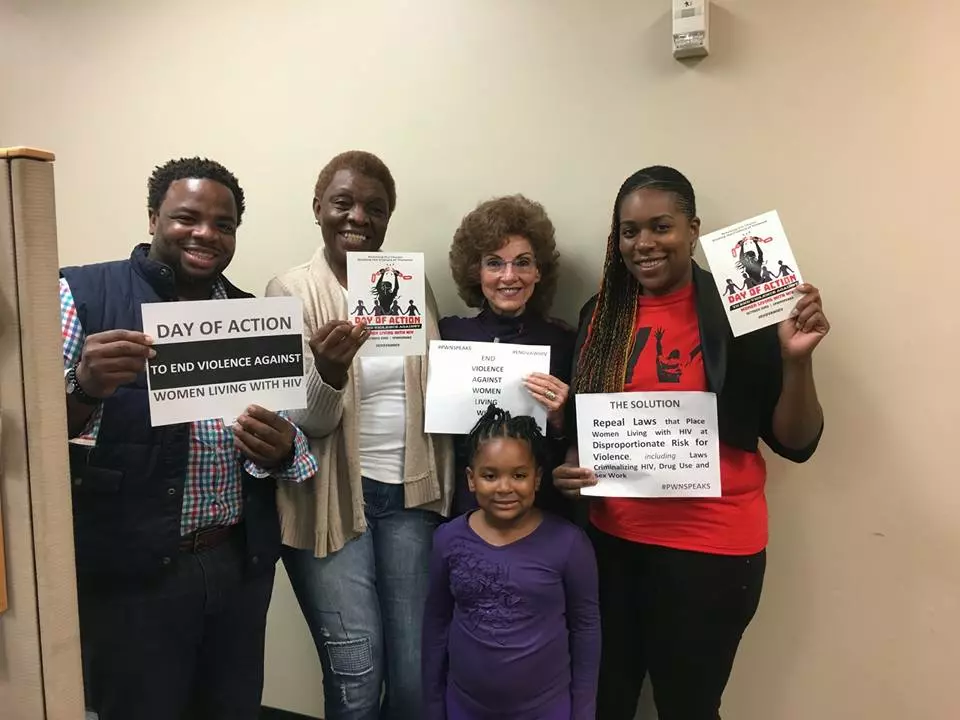
On October 23, 2017, Positive Women sponsored a National Day to End Violence Against Women Living with HIV. For women of color living with HIV, there are many barriers to care. Through supportive services, the “Ryan White program and Medicaid, among others, have been essential to assuring access to health care and treatment for women living with HIV (WLHIV).” This program, through a variety of grant programs, has become a lifeline to necessary medical and social support services.”
“Minority women comprise the majority of Ryan White clients, 61.8 percent are African American women while Latinas account for 19.2 percent.” Statistics highlight overrepresentation of women of color utilizing services from this programming and point to the need for program expansion and legislation advocacy. “
Through these programming, policy and legislation efforts, comprehensive care is available to people who would not otherwise be able to afford it.
A recent survey of Positive Women’s Network (PWN) USA’s membership (N=250) showed that “44% relied on Medicaid, 33% on Ryan White (non-ADAP), and 24% on the Ryan White AIDS Drugs Assistance program. Both the Ryan White program and Medicaid require women living with HIV to be poor in order to qualify for services.”
This year’s theme centers on economic security, health, and violence. Lack of access to comprehensive and supportive services and programming for women of color living with HIV leaves them with few options to fulfill basic needs.
You can’t access what you don’t have
The Indiana Credentialing Association on Alcohol & Drug Abuse (ICAADA) hosted a six-hour training course entitled “HIV-AIDS Training for Substance Abuse Professionals.” Covering goals such as understanding HIV/AIDS, risk, and Hepatitis C, the following statistics are offered as takeaways from the training:
- Indiana is a low incidence state, with an estimated 10,000 total persons living with HIV/AIDS
- Illinois has an estimated 37,592 total persons living with HIV/AIDS
- Marion and Lake County are two highest reporting counties in the state
- Marion County (Indianapolis, etc) reported 4,986 total persons living with HIV/AIDS
- Lake County (Gary, Hammond, Merrillville, East Chicago, etc) reported 1,174 total persons living with HIV/AIDS
- St. Joseph’s County is the third largest reporting county in the state with 628 total persons living with HIV/AIDS
*Marion County Public Health Department Ryan White HIV Services Program Annual Report: Indiana Persons Living with HIV Disease as of December 31, 2016
Among the grant areas for the Ryan White HIV Services Program in Indiana, Marion County was among the targeted ten counties. Lake County was not identified as a county receiving funding, therefore leaving women in color in this county to utilize Medicaid among “other” programming and services.
Driving distance to the closest county receiving funding for those that can not afford medical care is an hour and a half by car. Some of the funded services include medical case management, substance/use abuse services, health education/risk reduction, legal services, psychosocial support services, only to name a few.
The Ryan White Program stands as an integral social safety net, without this funding it is unclear how counties are ensuring economic security, access to healthcare and programming and support against violence.
“Most HIV-positive women (76 percent) are caring for children under age 18 in their homes.” – Health Resources and Services Administration (HRSA)
Barriers to care
Understanding that intersecting barriers interfere with women of color living with HIV, “ability to adhere to medical regimens” focus on their whole care, manage households– for instance, will help organizers, advocates, policymakers, program developers, and health care providers plan and develop more intentional care, programming and legislation. A reflection on cultural competency yielded the following barriers to receiving, accessing and remaining in care:
- Women experience gender roles and sex and sexuality differently from men.
- Level of education, fear of physical abuse and, more generally, gender inequality in relationships are all factors in seeking and staying in care
Women of color face greater challenges at the intersections of stigma and criminalization, related to living with HIV within the family, school, and community.
In addition, “for them, having HIV/AIDS is just one more overwhelming problem to deal with, behind providing food and a place to live for their children; keeping the lights on; and, often, other medical issues, such as diabetes, mental health issues, substance abuse, and even managing the health needs of a child who was born with HIV.”
Further evaluation and data are needed on the unique experiences and challenges of women of color living with HIV. Given that this program is geared towards individuals that would not be able to afford care, and Due to overrepresentation, a review of utilization, effectiveness and reach are needed relating to HIV/AIDS services in Lake County, Indiana, and nationally, for women of color. The identified gap in critical funding for services and support within this county amplifies the inequalities at these intersections.
As services disappear or are nonexistent in local areas, the Positive Women’s Network launches it’s #PWNCares campaign which seeks to fill a gap as stated by Naina Khanna, Executive Director of PWN-USA.
“Feeling alone is a major barrier to engagement and retention in care. Many women, especially outside of major urban centers, may not know any other women living with HIV. Our goal is to provide them the tools, knowledge, and support they need to make healthy decisions for themselves and live life to the fullest – while also offering a pathway to a national community of women living with HIV.”
The Positive Women Network’s flash blog series highlights stories from women that have received support from the network. Follow them on twitter@uspwn and at #PWNCares , to find out how to get involved on this day of action. You can raise your awareness on this issue by checking out the “Intro Flash blog to End Violence Against #WLHIV”




